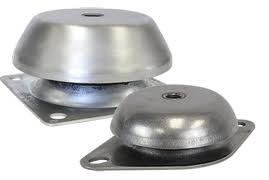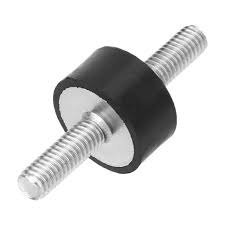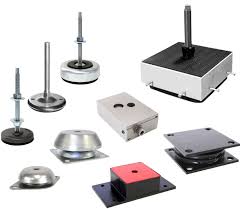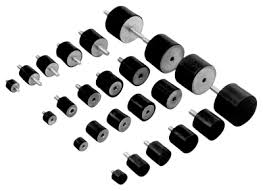Vibration isolators are crucial components in HVAC systems, as they play a significant role in maximizing efficiency and reducing the wear and tear on equipment. In this complete guide, we will explore the importance of vibration isolators in HVAC systems and how they can be utilized to enhance overall performance. Whether you are a professional in the HVAC industry or simply looking to improve the efficiency of your system, this guide will provide valuable insights into the use of vibration isolators in HVAC applications.
Maximizing HVAC Efficiency with Vibration Isolators: A Complete Guide provides detailed information on how to optimize the performance of HVAC systems through the use of vibration isolators. The guide covers the various types of vibration isolators available, their application in different HVAC components, and the benefits of using them to reduce noise and vibration in the system. It also offers practical tips for selecting the right vibration isolators and maintaining them for long-term efficiency. Whether you are a facilities manager, HVAC technician, or building owner, this guide can help you make informed decisions about improving HVAC performance and reducing energy consumption.
Maximizing HVAC Efficiency with Vibration Isolators: A Complete Guide is a comprehensive resource that delves into the use of vibration isolators in HVAC systems to enhance their efficiency. The guide offers in-depth insights into the different types of vibration isolators available and their applications across various HVAC components. It outlines the advantages of employing vibration isolators to mitigate noise and vibration within the system. Additionally, the guide provides practical advice on selecting suitable vibration isolators and maintaining them to ensure long-term efficiency. Designed for facility managers, HVAC technicians, and building owners, this guide is an invaluable tool for making informed decisions regarding HVAC performance improvement and energy consumption reduction.
The Importance of Vibration Isolators in HVAC Systems

Vibration isolators play a crucial role in HVAC systems by reducing the transmission of vibration and noise from equipment such as chillers, pumps, and air handling units. These isolators help to prevent damage to the surrounding building structure, as well as minimize noise and vibration levels within the occupied spaces. One of the key benefits of vibration isolators in HVAC systems is the protection of sensitive equipment and components from excessive vibrations, which can lead to premature wear and malfunction. By installing isolators, the overall longevity and performance of HVAC equipment can be greatly improved. In addition to equipment protection, vibration isolators also contribute to improved indoor air quality and occupant comfort. Excessive vibration and noise can create disturbances within a building, negatively impacting the overall environment. By effectively isolating vibrations, the comfort and well-being of building occupants can be greatly enhanced. Overall, the importance of vibration isolators in HVAC systems cannot be overstated. They provide essential protection for equipment, improve indoor air quality, and contribute to a more comfortable and pleasant building environment. Consequently, the proper selection and installation of vibration isolators are critical considerations for any HVAC system design or upgrade.
Choosing the Right Vibration Isolators for Your HVAC Unit

When choosing the right vibration isolators for your HVAC unit, there are a few key factors to consider. First, you'll need to determine the weight of your HVAC unit, as this will help determine the necessary load capacity for the isolators. Additionally, consider the type of HVAC unit you have (such as rooftop or ground-mounted) as well as the specific vibration levels it produces. It's also important to select isolators with the proper type of mounting (such as bolt-down or free-standing) and to ensure they meet any relevant industry standards for vibration isolation. Taking these factors into account will help you choose the right vibration isolators to effectively reduce noise and vibration from your HVAC unit.
Common Issues with Vibration Isolators in HVAC

Some common issues with vibration isolators in HVAC systems include: 1. Misalignment: If the vibration isolators are not properly aligned with the equipment and supporting structure, it can lead to increased vibration and wear on the isolators. 2. Overloading: Exceeding the weight capacity of the vibration isolators can cause them to fail prematurely and may result in damage to the HVAC equipment. 3. Corrosion: Exposure to moisture and chemicals in the HVAC environment can cause corrosion of the isolator components, reducing their effectiveness over time. 4. Improper installation: Incorrect installation of vibration isolators can lead to ineffective vibration control and may result in increased noise and vibration transmission. 5. Age and wear: Over time, vibration isolators can deteriorate and lose their ability to effectively dampen vibration, leading to increased wear and potential failure of the HVAC equipment. To prevent these issues, it is important to regularly inspect and maintain the vibration isolators, ensure proper alignment and loading, and replace any worn or damaged isolators as needed.
Maximizing Efficiency with Vibration Isolators for HVAC Equipment
hvac vibration isolation

Vibration isolators for HVAC equipment are designed to reduce noise and vibration transmission from the equipment to the rest of the building. By using vibration isolators, the efficiency of HVAC systems can be maximized, as the equipment can operate at optimal performance without causing disturbances or structural damage. Vibration isolators are typically made from materials such as neoprene, rubber, or springs, which absorb and dampen the vibrations generated by the HVAC equipment. By installing vibration isolators, the lifespan of the HVAC equipment can be extended, as the components are protected from excessive wear and tear caused by vibration. In addition to protecting the equipment, vibration isolators also contribute to a more comfortable and quiet indoor environment by minimizing the transmission of noise and vibration through the building structure. This can lead to improved occupant satisfaction and productivity, particularly in commercial and residential buildings. Overall, maximizing efficiency with vibration isolators for HVAC equipment is essential for achieving optimal performance, prolonging equipment lifespan, and creating a comfortable indoor environment.
Understanding the Role of Vibration Isolators in HVAC Maintenance
vibration isolation components
Understanding the role of vibration isolators in HVAC maintenance is crucial for ensuring the efficient and effective operation of heating, ventilation, and air conditioning systems. Vibration isolators are designed to minimize the transmission of vibrations and noise from HVAC equipment to the surrounding building structure. By installing vibration isolators, HVAC systems can operate more quietly and with reduced wear and tear on system components. This can result in lower maintenance costs and extended equipment lifespan. Regular inspection and maintenance of vibration isolators are important to ensure that they continue to perform as intended. This includes checking for signs of wear or damage, adjusting the isolators as needed, and replacing them when necessary. Overall, understanding the role of vibration isolators in HVAC maintenance can help facility managers and HVAC technicians to optimize system performance and minimize downtime.
The Impact of Vibration Isolators on HVAC Performance
Vibration isolators play a crucial role in HVAC system performance by reducing the transmission of noise and vibration to the surrounding building structure. They help to minimize the impact of operational vibrations on system components, ensuring that the HVAC equipment operates at optimal efficiency and longevity. By effectively isolating the equipment from structural vibrations, vibration isolators not only enhance the overall performance of the HVAC system but also contribute to a quieter and more comfortable indoor environment. Additionally, they can also reduce maintenance requirements and operational costs by minimizing wear and tear on system components. Overall, the use of vibration isolators has a significant impact on HVAC performance and should be carefully considered in system design and installation.
Comparing Different Types of Vibration Isolators for HVAC Applications
One of the most important factors to consider when comparing different types of vibration isolators for HVAC applications is the level of vibration control they provide. Spring isolators are commonly used and are effective at reducing vibration, but they may not be suitable for all types of HVAC equipment. Neoprene mounts are also popular and offer good vibration isolation, particularly for lighter HVAC units. However, for heavier equipment, a combination of spring isolators and neoprene mounts may be necessary to achieve the desired level of vibration control. Additionally, it is important to consider the maintenance requirements and longevity of the isolators, as well as their ability to withstand environmental factors such as moisture and temperature fluctuations. Overall, the best vibration isolator for a specific HVAC application will depend on the type and size of the equipment, as well as the specific requirements for vibration control in the given space.
Key Considerations for Installing Vibration Isolators in HVAC Systems
When installing vibration isolators in HVAC systems, it is important to consider factors such as the size and weight of the equipment, the level of vibration expected, and the type of isolation needed (e.g. spring, neoprene, or elastomeric). The location of the isolators and their compatibility with the existing support structure should also be carefully evaluated. Additionally, it is essential to account for any potential sources of interference or resonance that could affect the performance of the isolators. Proper planning and expert consultation can help ensure the successful installation of vibration isolators in HVAC systems.
In conclusion, utilizing vibration isolators in HVAC systems is crucial for maximizing efficiency and reducing maintenance costs. By properly installing and maintaining vibration isolators, the overall performance of the HVAC system can be significantly improved, resulting in energy savings and extended equipment lifespan. Therefore, vibration isolators HVAC should be considered a vital component in any HVAC system to ensure optimal performance.
See also
https://www.dynemech.com/vibration_isolation.html